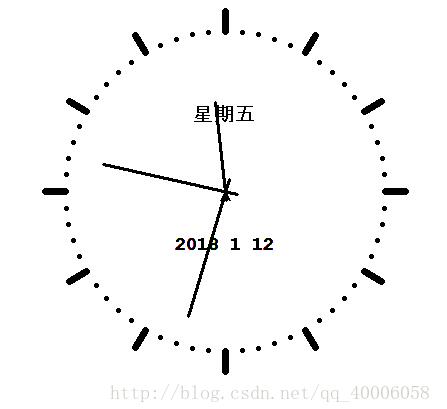Python函数库众多,而且在不断更新,所以学习这些函数库最有效的方法,就是阅读Python官方文档。同时借助Google和百度。
本文介绍的turtle库对应的官方文档地址
绘制动态钟表的基本思路如下(面向对象的编程):
使用5个turtle对象 1个turtle:绘制外表盘 3个turtle:模拟表针行为 1个turtle:输出表盘上文字
根据实时时间使用ontimer()函数更新表盘画面,显示效果如下:
相关函数的使用在程序中进行了详细的注释,代码如下:
# -*- coding: utf-8 -*-
"""
Created on Fri Jan 12 10:43:55 2018
@author: Administrator
"""
from turtle import *
from datetime import *
def skip(step):
penup()
forward(step)
pendown()
def mkhand(name,length):
#注册turtle形状,建立表针turtle
reset()
skip(-length*0.1)
begin_poly()
forward(length*1.1)
end_poly()
handform=get_poly()
register_shape(name,handform)
def init():
global sechand,minhand,hurhand,printer
mode("logo")
#重置turtle指向北
#建立三个表针turtle并初始化
mkhand("sechand",125)
mkhand("minhand",130)
mkhand("hurhand",90)
sechand=Turtle()
sechand.shape("sechand")
minhand=Turtle()
minhand.shape("minhand")
hurhand=Turtle()
hurhand.shape("hurhand")
for hand in sechand,minhand,hurhand:
hand.shapesize(1,1,3)
hand.speed(0)
#建立输出文字turtle
printer = Turtle()
printer.hideturtle()
printer.penup()
def setupclock(radius):
#建立表的外框
reset()
pensize(7)
for i in range(60):
skip(radius)
if i %5==0:
forward(20)
skip(-radius-20)
else:
dot(5)
skip(-radius)
right(6)
def week(t):
week=["星期一","星期二","星期三","星期四","星期五","星期六","星期日"]
return week[t.weekday()]
def date(t):
y=t.year
m=t.month
d=t.day
return "%s %d %d" %(y,m,d)
def tick():
#绘制表针的动态显示
t=datetime.today()
second=t.second+t.microsecond*0.000001
minute=t.minute+second/60.0
hour=t.hour+second/60.0
sechand.setheading(6*second)
minhand.setheading(6*minute)
hurhand.setheading(30*hour)
tracer(False)
printer.forward(65)
printer.write(week(t),align="center",font=("Courier",14,"bold"))
printer.back(130)
printer.write(date(t),align="center",font=("Courier",14,"bold"))
printer.home()
tracer(True)
ontimer(tick,100)#100ms后继续调用tick
def main():
tracer(False)
init()
setupclock(160)
tracer(True)
tick()
mainloop()
main()运行结果

以上就是本文的全部内容,希望对大家的学习有所帮助,也希望大家多多支持脚本之家。